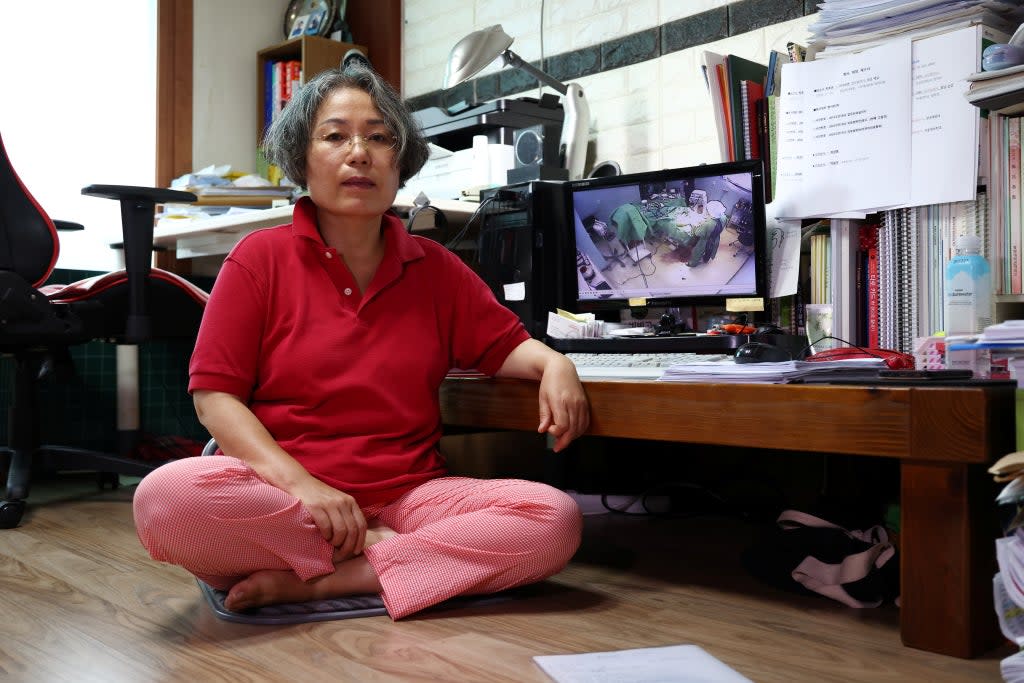How South Korea lost faith in its surgeons

On 8 September 2016, Kwon Dae-hee – a university student – went under the knife to get his jaws “fixed”. He had seen an ad for a plastic surgery centre in Seoul called Center A, and was determined to get a slimmer jawline.
His mother says Kwon, then 25, was bullied in high school for his prominent chin, an experience that left him determined to get the $5,600 (£4,000) cosmetic surgery.
“14 Years In Business Without A Single Medical Accident”, read an advertisement by Center A.
Soon after the surgery, however, Kwon slipped into a coma for 49 days. He had lost over 3.5 litres of blood and died due to excessive bleeding on 6 October 2016.
On Tuesday, Korean MPs voted in favour of installing CCTV cameras in hospital operating theatres across the country, after a campaign inspired in large part by Kwon’s death.
Lee Na-geum, the student’s devastated 61-year-old mother, has been holding a one-person protest in front of the country’s parliament since January 2018.
After Kwon’s death, Ms Lee obtained the CCTV footage of the surgery and analysed it, as she claimed, “thousands of times”. She told Reuters she was able to prove the surgery was performed, in part, by an unqualified nursing assistant and an intern and not by the plastic surgeon as promised.
Medical groups and hospitals have claimed the proposal "undermines doctors" and would lead to a "collapse" of health care https://t.co/RzM7TAfSIp
— Sky News (@SkyNews) August 30, 2021
Ms Lee sued Center A and the head surgeon using the video evidence she had gathered since the death of her son. A court found the surgeon guilty of involuntary manslaughter and sentenced him to three years in prison.
“It is a medical crime when someone else – ‘a ghost’ – performs the surgery and not the surgeon hired without the patient’s consent,” she said.
“There are so many unfortunate bereaved families who cannot reveal the truth because they don’t have physical evidence when a healthy person dies in an operating room.”
The case gained prominence as a result of Ms Lee’s protest and intensified the push for CCTV cameras to be installed inside all operation theatres across hospitals in South Korea. Several similar accusations of unqualified staff performing surgeries have surfaced over the years.
The new law’s passage in parliament on Tuesday comes despite a strong push back from the country’s medical fraternity.
CCTV cameras could be placed in hospital operating rooms in South Korea after surgery mistakes 👇🏼 https://t.co/j78z5EMtof
— EVE LYN FOLLOWER AND MESSENGER OF JESUS CHRIST (@StandFirm4Jesus) August 30, 2021
The bill had been roundly rejected by doctors, hospitals and several medical groups in the country, including the 140,000-member Korean Medical Association (KMA), which claims the move will violate patient privacy and discourage doctors from taking risks to save lives.
“We think trust is key in a doctor-patient relationship ... the bill undermines doctors to actively recommend treatment methods and treating patients,” KMA spokesperson, Park Soo-hyun, said.
“Residents have already expressed their intent not to apply to surgery or surgical departments if the CCTVs are installed in operating rooms, which will lead to a collapse of an essential part of South Korea’s medical care,” she added.
At the same time, the plastic surgery industry in South Korea is worth $10.7bn (more than £7.7bn). Activists point to weak regulations allowing the use of “ghost doctors” in factory-like clinics, where unqualified staff substitute for surgeons on a large scale.
And the law does seem to enjoy overwhelming public support. In a June poll conducted by the Anti-Corruption and Civil Rights Commission, an independent government agency, the bill had the support of 97.9 per cent of the 13,959 respondents.
South Koreans are in general more used to CCTV as a fact of life. According to statistics portal Statista, there are almost 1.15 million CCTV cameras in operation across the country as of 2019. “This is an increase of around 200 per cent in comparison to five years ago,” it said.
Additional reporting by Reuters
Read More
Japanese prime minister Yoshihide Suga to resign after surge in Covid cases
S.Korea says it is developing more powerful missiles to deter N.Korea
China’s new rules banning children from playing video games for too long, explained
Covid situation in Japan becoming ‘natural disaster’, health officials warn
#MeToo: South Korea seek to criminalise ‘semen terrorism’
K-Pop singer Seungri sentenced to three years in prison over prostitution and gambling scandal


